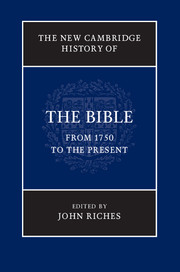Book contents
- The New Cambridge History of THE BIBLE
- Series page
- The New Cambridge History of THE BIBLE
- Copyright page
- Contents
- Figures
- Contributors
- Preface
- Abbreviations
- Introduction
- Part I Producing the Text
- Part II New Modes of Study of the Bible
- Part III Reception of the Bible Geographically
- Part IV Reception of the Bible Confessionally
- Part V Thematic Overview: Reception and Use of the Bible, 1750–2000
- 30 The Bible in society
- 31 The Bible in literature
- 32 The Bible in film
- 33 The Bible in music
- 34 The Bible in art
- 35 The Bible and science
- 36 The Bible and hymnody
- Conclusion
- Select bibliography
- Index of biblical manuscripts
- Index of scriptural sources
- General index
35 - The Bible and science
from Part V - Thematic Overview: Reception and Use of the Bible, 1750–2000
Published online by Cambridge University Press: 09 June 2015
- The New Cambridge History of THE BIBLE
- Series page
- The New Cambridge History of THE BIBLE
- Copyright page
- Contents
- Figures
- Contributors
- Preface
- Abbreviations
- Introduction
- Part I Producing the Text
- Part II New Modes of Study of the Bible
- Part III Reception of the Bible Geographically
- Part IV Reception of the Bible Confessionally
- Part V Thematic Overview: Reception and Use of the Bible, 1750–2000
- 30 The Bible in society
- 31 The Bible in literature
- 32 The Bible in film
- 33 The Bible in music
- 34 The Bible in art
- 35 The Bible and science
- 36 The Bible and hymnody
- Conclusion
- Select bibliography
- Index of biblical manuscripts
- Index of scriptural sources
- General index
Summary
Keywords
- Type
- Chapter
- Information
- The New Cambridge History of the Bible , pp. 707 - 724Publisher: Cambridge University PressPrint publication year: 2015

